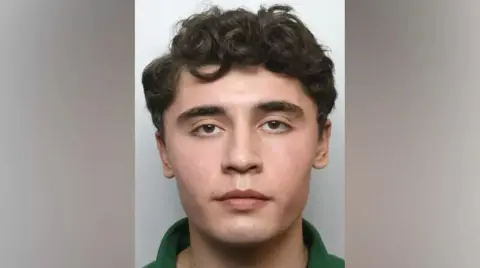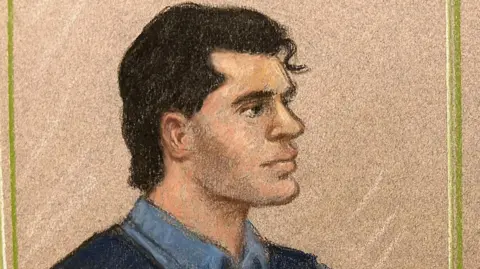 MET Police
MET PoliceA former British Army soldier accused of spying for Iran while on the run from prison has told a court he agreed to travel to the Middle Eastern country but “deliberately sabotaged the operation”. .
Giving evidence at his trial at Woolwich Crown Court, Daniel Khalife said he flew to Turkey in August 2020 and intended to travel on to Tehran.
But Mr Khalife said he told his handlers in Iran he was too afraid to do so.
Prosecutors alleged that Mr Khalife collected sensitive military intelligence for Iran, and later hid it under a food truck to escape from Wandsworth prison in south-west London on September 6, 2023. He denies the charges.
On Thursday, Mr Khalife told the court that his handlers wanted him to go to the Iranian capital as “it was standard procedure for assets to go to the state”.
He was 18 years old at the time and serving in the British Army.
“I knew the only way I could travel without a visa was an airline called Mahan Air which is owned by the IRGC,” Mr Khalife told the court, referring to the Islamic Revolutionary Guard Corps. branch of the Treaty on the Functioning of the European Union. the Iranian armed forces.
The jury heard that after arriving in Istanbul, he told his handlers that he was too “scared” to fly to Iran because the aircraft was “30 years old”.
Mr Khalife said he was genuinely concerned that there could be consequences if his handlers discovered that the information he had given them was “completely bogus”.
“I felt this would be dangerous,” he told the court.
The trial previously heard that police found “completely fake” documents purporting to be from MPs, senior military officers and the security services in Mr Khalife’s room.
Mr Khalife sent a video of himself to his handlers at the Hilton Istanbul Bomonti hotel after they suspected he might not have actually traveled to Turkey.
He said they also sent someone “to scope [him] out” in a vehicle.
After returning to the UK, Mr Khalife sent an audio message to his original Iranian contact which said: “I delivered them a package, I don’t think I should tell you – but don’t mention it to anyone.”
He told the court in London that “of course” he had not delivered a package.
 Julia Quenzler
Julia QuenzlerMr Khalife also addressed images on his phone being used as evidence against him, claiming his British troop commander sent him some on WhatsApp.
He claimed the 12 images were screenshots taken from an internal communications system, prosecutors said, and were sent to him and other soldiers as orders by his captain.
The jury previously heard that the Army was not supposed to use WhatsApp for orders.
“At the time it was very frustrating to put so many images on a device,” Mr Khalife told the court.
He said the commander “couldn’t resist writing the actual message” and instead sent a screenshot from MoDNet, the communications system used by the Army.
Asked about another image on his phone sent by an officer, he said: “The only reason this was on my device is because they sent it to me.”
Some other pictures on his phone were ones he had taken himself because he had been asked to send them to more senior soldiers on WhatsApp, Mr Khalife said.
His defense counsel Gul Nawaz Hussain KC asked: “Did you ever say, were you disciplined or disciplined for doing that?”
“On the contrary,” said Mr Khalife, “I was inspired”.
The 23-year-old also said he had received a list on WhatsApp of all the soldiers who had been promoted to sergeant, including 15 in the Special Forces.
Special Forces soldiers are known as the Army’s “protected population” – but Mr Khalife explained how he could identify their first names by typing their surnames into the Army’s leave booking system.
“You would put in a surname and a very long list of information would come out. A clear flaw,” he said.
The jury heard that Mr Khalife thought the British security services would be “impressed” with what he found.
“I was the only person in the Ministry of Defense who found this flaw,” he claimed, adding that he only searched the names of seven officers.
“It was a way to advertise my skills.”
Prosecutors allege that Iran’s intelligence service paid Mr Khalife for secret information gathered while he was in the Army.
Mr Khalife said he had “always had a gift for exposing security flaws”.
On Wednesday, the jury heard, 15-year-old Mr Khalife used a powerful magnet to remove store security tags and got into trouble with the police for shoplifting.
Mr. Khalife denies collecting and sending intelligence to an enemy, namely Iran.
He also denies taking a list of special forces soldiers who could be useful to terrorists, making a hoax bomb at his barracks and escaping from Wandsworth Prison.
His testimony and the trial continue.
#Daniel #Khalife #spoiled #surgery #travel #Iran
